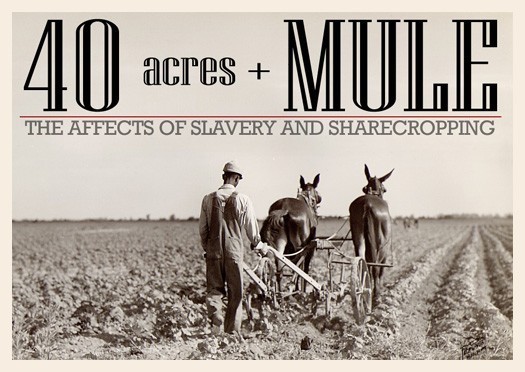Before you read the article: Thank you, all, for reading my article. I’m a part of the largest online marketplace for Black-owned businesses called We Buy Black. Similar to Etsy or Amazon, this website allows for Black-owned businesses to create a shop and sell their amazing products to the world! If you have a product, you should definitely join this platform! We Buy Black also has it’s Inaugural We Buy Black Convention happening this November 16th-17th in Atlanta, GA and I hope to see you all there. In fact, I along with hundreds of others will be wearing our official We Buy Black T-shirt, so here’s my gift to you: Get 50% off the official WBB T-shirt using my code WBB2018. Peace, family!
On This Day In History
Have you ever wondered where “40 acres and a mule” came from? No, I don’t mean filmmaker Spike Lee’s production company, although it is related. After the American Civil War, newly freed Black adults were to receive 40 acres and a mule as a form of reparations for their bondage. Did you know that Thaddeus Stevens, a White Radical Republican, proposed that idea on this day in history? Stevens urged Congress to confiscate the estates of Confederate leaders and distribute the land back to their former slaves in 40-acre increments. As you can imagine, many people opposed this idea. Both Democrats and Republicans thought Stevens’ idea was far too radical. Then-president Andrew Johnson staunchly opposed the notion and Stevens moved to have Andrews impeached.Reconstruction
Stevens’ proposition to administer 40 acres to each adult freedman was part of Reconstruction. The Reconstruction era was meant to establish economic stability after the abolition of slavery. Ideally, this new form of economic stability was going to benefit freedman and former slave owners alike. But although the U.S. government had mentioned that every adult freedman would receive 40 acres and a mule as a form of reparations, we never received such compensation. But the former slave owners received compensation. What a surprise. [caption id="attachment_8229" align="aligncenter" width="637"] We’re still looking for our 40 Acres and our mule like…[/caption]
We’re still looking for our 40 Acres and our mule like…[/caption]
Benefit?
When you consider the Japanese internment camps here in the U.S. and the reparations that the victims received after liberation, you may be left a bit puzzled. The victims of the Japanese internment camps received money. Why not give money to the freedmen after the abolition of slavery? Had newly freedmen been paid reparations through 40 acres and a mule, the benefits would have been substantial. Black people in the American South had been conditioned to harvest cotton for their masters all their lives. Newly freedmen could have profited quickly and with ease instead of receiving a lump sum with the illiteracy to invest it properly. However, that would have granted the Black community economic independence. The government didn’t want that.Modern Day
There are some forms of reparations in place today, like affirmative action. Of course, people claim that affirmative action is reverse racism but that term truly holds no merit in Western civilization. Additionally, the U.S. government claimed that welfare was a form of reparations for us. However, the media exposed a “welfare queen;” a Black woman who used her welfare check to buy designer brands for herself. Although this is a misuse of those funds, let’s not forget that people of all races do the same thing. So, we never got our 40 acres nor the mule, but we did get a dope production company out of it. We were also able to develop a conversation around reparations. Does the Black community deserve reparations? Yes, we do. But it’s obvious that we cannot hold our breaths waiting for them. We have to help ourselves. That’s what We Buy Black is really about: economic independence and self-reliance.









